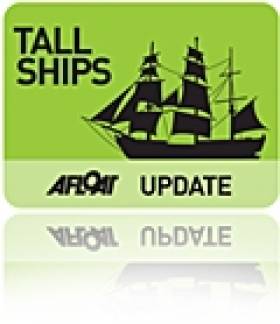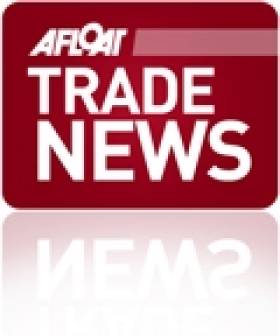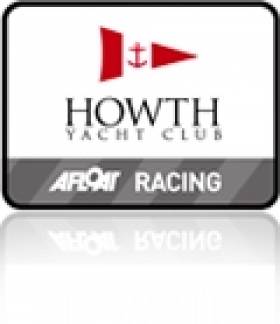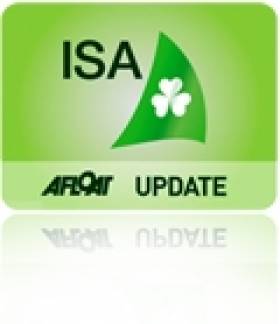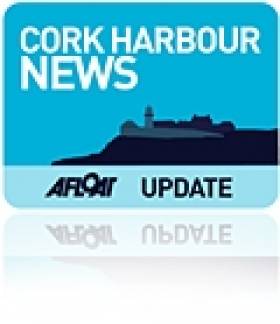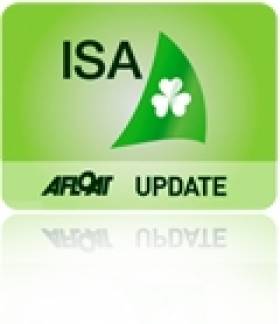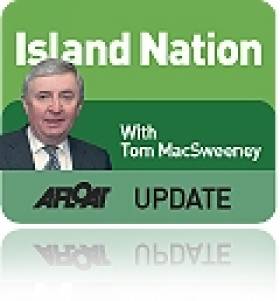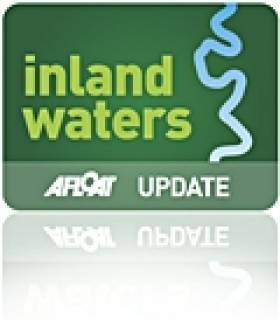Displaying items by tag: Irish Sailing Association
Sail Training Ireland to be Launched Next Week
Since the Department of Defence declared they no longer had an interest in sponsoring the continuation of the Asgard Sail Training Programme, and the subsequent decision of the Board of Asgard to wind up the Company, a working group supported by the ISA has worked to establish a National Sail Training Association.
Sail Training Ireland for Youth Development Ltd. has been established as a limited company recognised by Sail Training International as the representative body for Sail Training activities in Ireland.
An objectives of the organisation is to promote the development and Education of young Men and Women on the Island of Ireland in and through the Sail Training Experience regardless of Nationality, Culture, Religion, Gender or Social Background.
City Powerboat School on the Market
Due to an opportunity for its owners overseas Dublin City's only powerboat training school, City Powerboat School is on the market. The Irish Sailing Association recognised training establishment is advertised in next week's edition of Afloat magazine. The school operates in the 'highly visible' River Liffey area. School principal Felix Finlay says 'the position of the school in Dublin City has attracted many enquiries, for not only powerboat training courses, but sail training, tourism activities, and educational opportunities'. More here.
Sailing School Navigates Beyond the Gloom
The Principal John Moore has discounted all prices by 20 to 30%. All 2009 sailors returned in 2010 and brought friends with them. The French network of the newly appointed Director of Sailing Hugues Traonmilin has brought French families to the island and the French sailors were mixed with the Irish and British children and adults with great success. In addition to a busy summer season, 60 students of a South East College came for the very first time to the Sailing School in March 2010 as part of the Transition Year programme. They were hosted with full board accommodation at the Sailing School Guest house.
Definitely the location of the Sailing School plays a big part in this success story. Heir Island is located in the middle of Roaring Water Bay half way between Schull and Baltimore. Whatever direction you sail from the Sailing School beach, you'll encounter wonderful maritime landscapes and crystal clear waters. The Topaz dinghy fleet may sail to 3 or 4 different sandy beaches on one sailing day. The 3 Dublin Bay Mermaids sailing in flotilla explore the surrounding islands of Castle Island, Sherkin Island, the 3 Calves Islands and of course the Carthy's Islands to visit the seals colony.
Such a fantastic location has orientated the programme of this Sailing School towards the "Adventure" courses of the Irish Sailing Association. The school offers Adventure 1 & 2 courses as their "speciality" course.
2011 perspectives are already very encouraging with a second college to be hosted in Spring for a 10 day transition programme meanwhile the first one is returning after excellent feedback of the 2010 students and teachers. Being a family run business makes this small company very flexible and the range of their activities covers young sailors from 8 years old to adults, groups and families, on dinghies or on a traditional Heir Island Lobster Boat, and on kayaks if you don't want to sail. Also as a qualified Yachtmaster Instructor, the director of sailing has facilitated individually tailored sail training for yacht owners aboard their own yacht, an option that has proven both practical and successful.
More information HERE.
HYC Hires Coaching Development Manager
Howth Yacht Club has announced its first ever coaching development manager.
Graeme Grant has been appointed to the position to help enhance the skills of members across all levels.
The 36-year-old Scot comes highly experienced, with Irish Sailing Association (ISA) qualifications as an Instructor Coach, Adventure Instructor and Powerboat Instructor among others.
Past sailing successes include the Scottish 420 Nationals and the Hornet Youth Worlds. Grant was also part of the British Olympic 470 Development Squad in the build-up to the 1996 games in Atlanta.
Since 2005 he has filled various coaching spots throughout Ireland, and is also bosun of ISA's Sailfleet J80s, a position he retains with his new role.
The Howth Yacht Club website has more on the appointment HERE.
Buoyant Dinghies Buck the Market
A massive drop in some areas of the boat sales market is not reflected in other areas, particularly small dinghy sales, if registration figures released by the Irish Sailing Association (ISA) is anything to go by.
In the dinghy market, in 2009 65 Optimist dinghies were registered (57 of them new). Last year 43 Oppies registered (27 of them new). In bigger boats, 27 ISA cruiser numbers were issued (new or second hand boats) in 2009 and in 2010 there were 50 cruiser numbers issued. There were also 18 other registrations from the 420, Mirrors and Squibs classes.
Sheila Tyrrell to Chair New Sail Training Group
The new umbrella organisation Sail Training Ireland includes a number of key sailing people involved in sail training in Ireland including the chief executive of the Irish Sailing Association Harry Hermon and Seamus McLoughlin the head of operations of Dublin Port Company. The group also includes Kalanne O'Leary, a former member of Coiste an Asgard, the state board that ran Asgard II. The full group, chaired by Sheila Tyrrell, has been named as follows:
Sheila Tyrrell, Chair
Harry Hermon, ISA Chief Executive
Philip Cowman ISA Director, Ex Harbour Master Waterford
Kalanne O'Leary, Irish Representative on Sail Training International
Seamus McLoughlin, Head of Operations, Dublin Port
Sean Flood, Sail Training International Ambassador – Ireland.
Looking for further reading on Tall Ships in Ireland? Click the links below:
Click this link to read all our Tall Ships Stories on one handy page
Previewing Ireland's Tall Ships 2011 Season
Can Ireland Get a New Tall Ship?
New Organisation Announced for Sail Training in Ireland
A sailing initiative aimed at Irish participation in next year's Tall Ships Races in Waterford has been announced by a newly formed national organisation Sail Training Ireland.
Since the sinking of the Asgard II and the decision to wind up Coiste An Asgard, the Irish Sailing Association (ISA) has been facilitating a steering group with the aim of establishing 'Sail Training Ireland'.
The steering group has been working with Sail Training International to establish a sustainable organisation that will work with training providers and host ports to build Ireland's Sail Training Programme in the future.
The Tall Ships Race that visited Belfast last year is due to return to Waterford in 2011 and Dublin in 2012 is clear recognition by the race organisers of Ireland's popularity as a destination, and a credit to the host ports who are able to facilitate such a great occasion.
The working group are preparing for the launch of Sail Training Ireland in a few weeks and are currently putting together a feasibility study and business plan for the organisation that may be presented to the Minister in the New Year.
Sail Training International has awarded a bursary to Sail Training Ireland which will provide funding to support the participation of young people in The Tall Ships Races 2011 and 2012.
"The small group that has been working on this will put together a sensible, practical but ambitious plan to ensure the legacy of Coiste an Asgard...." explains Nigel Rowe, Chairman of Sail Training International, "....it will enable Irish youth to continue to benefit from the sail training experience".
Sheila Tyrrell, Chair of the steering group, who has a long history with sail training and in particular the Asgard remarks "The bursary from Sail Training International is very welcome and endorses the credibility of our plans to re-establish a national sail training programme. The steering group will be in a position to effect the launch of Sail Training Ireland this side of Christmas."
Looking for further reading on Tall Ships in Ireland? Click the links below:
Click this link to read all our Tall Ships Stories on one handy page
Previewing Ireland's Tall Ships 2011 Season
Can Ireland Get a New Tall Ship?
All Ireland Champs Move to Kinsale
The re-run of the All Ireland Sailing Championships will take place in Kinsale and not Crosshaven on November 20th according to a press release from the Irish Sailing Association published today.
A minimum of three races must be completed for the competition to conclude and the ISA Helmsman's Trophy awarded.
The final, originally scheduled to take place in Royal Cork Yacht Club on the 26th of September, had to be abandoned due to an absence of wind.
The competition will be sailed in the ISA SailFleet J80's which are currently based in Kinsale Yacht Club. Due to the difficulty in safely sailing the fleet from Kinsale to Crosshaven the venue had to be changed, however the host club remains Royal Cork Yacht Club who are now kindly assisted by Kinsale Yacht Club.
8 teams will be competing for the ISA Helmsmans Trophy. As this competition is recognised as a new event, no previous points shall be carried forward. Each competitor begins with a blank score card.
The finalists are:
Anthony O'Leary
Ewen Barry
Garrett May
James Espey
Neil Kenefick
Niall Henry
Nicholas O'Leary
Nick Walsh
Who'll win? We're starting a readers poll on Monday. Click back to cast your vote!
David Harte Sets Another Headline
I have long admired the commitment and dedication to sailing of David Harte in Schull. With his design of the TR 3.6 he has achieved what may well prove to be the ideal boat for team racing. This aspect of sailing is proving very popular amongst younger sailors. In the past few months I have been watching and reporting on the development of the sport by Match Racing Ireland which is now an integral part of the Irish Sailing Association. There is an excitement and enthusiasm which is good for the sport.
Now Schull and David Harte are adding a new dimension with the TR 3.6 which seems a bit like a Firefly when you look at it first, but then there are clear differences in design. The 3.6, a two-person dinghy, is just that in length. "It is robust, cheap to produce and the first boat customised for team racing. This is a boat for people who don't own a boat. It is a boat made for a situation where different crews will be using it and it has to be able to stand up to that pressure. I looked at the concept of the Firefly and then adapted it to what will prove to be a good boat for team racing," David told me.
The boat was shown for the first time at the announcement that Schull will host the ISAF Team Racing World Championships which will be held in the West Cork harbour in 2011. Twenty-four teams from around the world will compete, with the Fastnet Outdoor Education Centre as the base. It has a proven record of success in teaching sailing as a curricular subject at the adjacent Schull Community College which, through the foresight of the Cork County Vocational Education Committee, established this approach several years ago.
David Harte manages the operation. The success of the Schull students in winning the British championships this year, as well as their progress in the sport elsewhere after they leave the college is a testimony to his success.
Next weekend the Irish Team Racing Championships will be held in Schull, with 18 teams from around the country competing "and 40 per cent of the helms will come from Schull," David told me with a satisfied smile, which he deserves to have.
It is intended to raise funding for a fleet of 25 new TR 3.6 boats which Schull will provide for the world championships. Afterwards the boats will remain there, providing more years of sailing for young people. A sponsorship project has been launched and already seven boats have been funded. It is intended to build the boats in Cork and to have the sails made there. The world championships are scheduled to start on Saturday, August 27, 2011.
Photos of the new design afloat HERE
• This article is reprinted by permission of the EVENING ECHO newspaper, Cork, where Tom MacSweeney writes maritime columns twice weekly. Evening Echo website: www.eecho.ie
Sailing Body Responds to Draft Waterways Bye-Laws
The Irish Sailing Association (ISA) says it sees no value registering small craft that launch from clubs and training centres on inland waterways. The sailing body comments come as part of a Public Consultation programme on proposed new Bye-laws for all seven Irish waterways. Waterways Ireland has commenced the first Phase of a review of bye-laws under its remit. Bye-laws facilitate the management of a waterway, clearly outlining the roles and responsibility of Waterways Ireland and all the people involved in using the navigation, whether for recreational or commercial purposes. The association says the new bye laws alos place an added administrative burden on volunteers when organising events. "The requirement to apply for permission to run every event on a weekly basis will create significant administrative workloads on already over burdened volunteers", it said. The full ISA submission is below:
General Observations
1. Definition of Craft Types
There are no fewer then 14 definitions describing different craft types referred to in the bye- laws. Many of the definitions do not adequately describe the type of craft they are referring to, and have definitions within definitions. It difficult to understand which byelaws are referring to which type of craft – this will lead to confusion and as a result non compliance.
For example: a. 'Pleasure Craft' includes personal watercraft and fast power craft'. Pleasure Craft would imply a craft used for pleasure purposes, and there are already definitions for personal watercraft and fast power craft described – so why duplicate?
b. 'Vessel' means every description of craft including non-displacement craft and sea planes but does not include a boat or personal water craft' A non displacement craft is included under the definition of 'craft' so why mention it? You also need to look up the definition for a 'boat' and 'personal watercraft' before you understand which types of craft are being referred to as a 'vessel'.
2. Insurance
We are fully behind the principal that every craft should have suitable insurance. However we believe this is a matter for the users, owners and organisations. We can see no good reason why Waterways Ireland need to be sent policies in 'original certificate form'. This puts the responsibility and hence the liability of adequate insurance onto Waterways Ireland and will require a significant bureaucratic overhead. It could easily be made an offence not to have insurance and leave it at that.
3. Duplication of Existing Legislation
Much of the content of the draft byelaws proposed is already covered under existing legislation. (eg the wearing of personal floatation devices, age limits for driving powered craft etc.). Duplication of this legislation within the bye laws will do nothing to encourage compliance, and will mean a revision of the byelaws every time there is a change in legislation.
4. Over Regulation/confusion
The draft byelaws as presented contain 32 pages of 'small print' regulations. Some of the terminology and definition used is legalistic and confusing. It will be a very difficult task to educate the waterways users as to their responsibilities towards the byelaws, and an even bigger task to enforce them.
There has been no mention of a plan for implementing the byelaws, and we would have concerns that Waterways Ireland do not have a plan or adequate resource to communicate sufficiently the detail of the byelaws, or to enforce compliance.
5. Safety
It has been shown time and time again that regulation used to manage activity on the water does little or nothing to improve safety standards unless there is sufficient resource to enforce it. The attempt within the bye laws to incorporate a 'one size fits all' set of regulations to manage activities on the waterways is inappropriate, unnecessary and will be impossible to enforce. As such it will lead to confusion and non compliance.
There are some 'bottle neck' areas of congestion, where more stringent control measures may be necessary in order to encourage responsible participation and enjoyment. We recommend a different set of regulations be developed for known trouble spots, leaving the majority of the waterways relatively unrestricted.
6. Link with existing Local Authority byelaws
In recent years, Local Authorities around the country have developed byelaws of their own to manage access to and activity on the waterways, harbours and beaches under their jurisdiction.
We are concerned that there appears to have been little consultation or coordination with local authorities who already have byelaws established, particularly counties which boarder Waterways Ireland navigation. This could potentially lead to one set of regulations applying whilst launching your craft from a local authority controlled slipway, whilst another set of regulations applying once under way on the water.
We strongly urge waterways Ireland to liaise with local authorities to ensure their byelaws are consistent with those already established.
Feedback on Specific Byelaws
(6) Registration The proposal set out in bye-law 6 needs a total revision.
a. Compulsory Registration
The ISA is not opposed to the principle of registration of vessels provided it is equitable, has a purpose (other than taxation) and is required only where necessary. Otherwise there will be a strong disincentive to register, and the cost of tracking down and seeking to make vessel owners compliant will exceed any possible benefit.
We do not see any value in the need for registering small craft that launch from clubs and training centres, which are under the control of and/or are participating in an organised activity.
b. ValidityPeriod
Where registration is required it is not sufficient to make it valid for a period to be decided by the Chief executive. A validity period should be clearly identified (5 years would seem appropriate) and communicated to all the keepers of registered craft.
c. Cost
Registration should not be seen as a revenue generator for Waterways Ireland. It should be administered at cost and fees set as such. Again this should not be at the whim of the Chief Executive.
d. Lettering
The proposal for all craft wishing to display their own print of the registration number to have 300mm high numbers (7)(b) port and starboard on the bow, and on the stern is completely ill-conceived. There is an assumption that the number issued by Waterways Ireland (7)(a) is the same size? For smaller craft it is simply not possible, and for larger craft will meet with huge opposition if it is implemented.
e. Insurance
We are fully behind the principal that every craft should have suitable insurance. This is a matter for the users and owners and we can see no good reason why WI need to
be sent this in 'original certificate form'. By checking an insurance policy Waterways Ireland is taking responsibility for ensuring all craft registered have adequate cover for any incident that they are involved with on the waterways. It could easily be made an offence not to have adequate insurance (putting the responsibility on the registered keeper) and leave it at that.
f. Visiting Craft
There are a number of craft that use the waterways occasionally when visiting the area. They are unlikely to have prior knowledge of the byelaws and often will not be in a position to apply for registration three weeks in advance. This will significantly restrict access, and/or encourage non compliance. Temporary visitors will need to be catered for.
g. On-LineRegistration
Waterways Ireland are proudly declaring the development of a 'computerised registration package', yet all registration applications must be submitted by hard copy 'snail mail'. This is not the modern way to do business.
h. Duplication of Registers
The ISA currently operates a Small Craft Register which is available on line and may be used to identify all types of craft. It may be has a five year validity and costs €15. We have the ability to process applications in a day. This is already being used by many local authorities that require permits to launch craft. We would welcome the opportunity to discuss the potential for combining the registers in order to help simplify registration system for the user.
(20) Zoning The ISA would ask Waterways Ireland to consult with us prior to implementing zoning, so we may help to ensure that congested areas are managed in a pro active way to encourage responsible participation, and will not cause confusion and/or unnecessarily restrict activity.
a. Restriction of Craft
Whilst we have no difficulty in 'Zoning' areas in order to pro actively manage use of the waterways in congested areas, it should be stressed that zoning may be required in congested areas in order to 'promote' responsible participation in activities. The current terminology used in the byelaws; 'restrict or prohibit craft from taking part' does not suggest Waterways Ireland is actively looking to promote activities on the waterways.
b. Consistent Markings
The ISA has been working with local authorities on implementing pro active management strategies for the management of beaches and harbours within their jurisdiction. The signage and buoyage for zoned areas need to be consistent with those used by local authorities and we would request that waterways Ireland consult with us prior to developing the infrastructure and management systems required for zoning.
(21) Commercial Operations
a. Voluntary Organisations
Byelaw 21 outlines the requirement to obtain permission to carry on any trade or business. It also mentions that there will be a charge levied in respect of this permission. There are a number of clubs and associations that organise training,
recreational and competitive events for which a charge is levied to the participants. This is not commercial activity, as the charge is to cover the costs of organising the said activity.
We believe it is not the intention of waterways Ireland that these clubs and associations will be charged for organising their activities, however this needs to be clarified.
b. Commercial Operators
The ISA has a number of accredited sailing schools and clubs that operate on the inland waterways. These organisations attract visitors and tourism to the area, whilst at the same time improving safety standards on the waterways.
There should be no charge levied for approved training activity that is carried out by an organisation that is accredited by a national authority and/or has been approved by Waterways Ireland.
(8) Owners, Masters and Crew of Craft
Paragraph (8). Carrying an anchor. It is not general practice in racing yachts to have an anchor stowed in such a position as 'to enable them to be dropped or weighed quickly'. This may incur a €150 fine depending on the interpretation of 'quickly'. This paragraph needs rethinking.
(25) Placing of objects
Clubs and training centres use temporary buoys to mark race courses, training areas etc. It is not reasonable to expect these organisations to apply for permission in writing every time they are involved in organised activity afloat.
(28) Miscellaneous Prohibitions
We note that there does not seem to be any prohibition on the causing of a nuisance for example by noise of engine, generator etc. in a public harbour to other users or any particular restriction on causing such annoyance. We believe such a prohibition should exist.
(32) Events If established organisations are forced to apply for permission for every event they organise their activities will not be sustainable.
a. Notification and Permission
An 'Event' is described as a 'regatta, race or any organised gathering of craft or people for the purpose of competition or display'.
Events in ISA organisations take place on a weekly and sometimes daily basis. They are often weather dependent and organised at short notice. It is unreasonable to expect clubs and associations to apply for permission organise every event, as this will severely restrict their ability to operate.
b. Insurance
ISA Clubs and Associations are fully aware of their responsibilities towards their liability for the organising of events, and carry insurance to cover all of their activities.
Should Waterways Ireland insist on receiving proof of insurance the liability may well be passed on to Waterways Ireland in the event the cover proves to be insufficient.
We recommend that paragraph 32. (6) (b) be removed.
c. Administration
ISA organisations are in the main run by volunteers. The requirement to apply for permission to run every event on a weekly basis will create significant administrative workloads on already over burdened volunteers.
We believe the intent of this bye law was not to restrict the activities of established clubs that organise regular events, and we recommend that for established clubs, training centres and associations affiliated to a recognised authority, a prior agreement be made between Waterways Ireland and the organisation concerned, to allow for the organising of events within agreed parameters without the need to apply for permission.


























